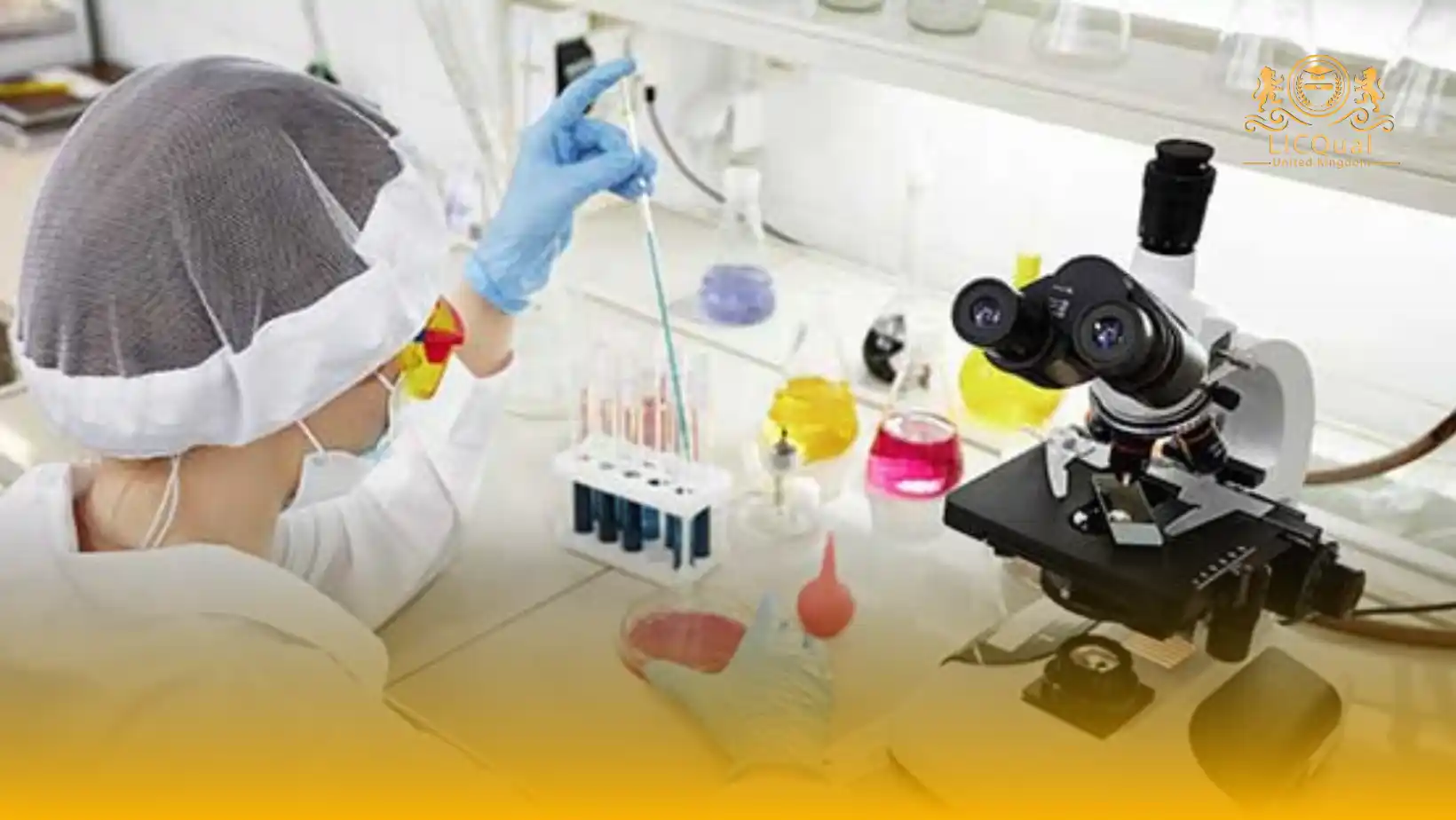The LICQual Level 3 Certificate in Biopharmaceutical Sciences (Cert Biopharmaceutical Sciences) is a specialised qualification designed for learners who aspire to build expertise in the rapidly evolving field of biopharmaceuticals. This course provides an in-depth understanding of biopharmaceutical principles, processes, and applications, preparing learners to contribute effectively to pharmaceutical research, development, and production.
This qualification is aimed at professionals who wish to enhance their career prospects, expand their technical knowledge, and strengthen their Continuing Professional Development (CPD). By combining both theoretical knowledge and practical applications, the programme equips learners with the skills needed to excel in areas such as biotechnology, pharmaceutical research, regulatory compliance, and drug development.
The course also places strong emphasis on global industry standards, ensuring that learners develop competencies aligned with the needs of modern healthcare and life sciences sectors. From molecular biology and bioengineering to clinical applications and quality assurance, the curriculum provides a comprehensive learning journey for individuals seeking career progression.
Centres delivering this qualification must ensure that competent and qualified staff, along with all necessary learning resources and laboratory facilities, are available to support effective training and learner success. High-quality teaching, access to up-to-date scientific materials, and a structured learning environment are essential for achieving the best outcomes.
With this certificate, learners will be well-prepared to advance their careers in biopharmaceutical sciences, biotechnology, and pharmaceutical industries, contributing to innovative solutions in healthcare and medicine.
Course Overview
Qualification Title
LICQual Level 3 Certificate in Biopharmaceutical Sciences (Cert Biopharmaceutical Sciences)
Total Units
6
Total Credits
24
GLH
120
Qualification #
LICQ2201142
Qualification Specification
To enroll in the LICQual Level 3 Certificate in Biopharmaceutical Sciences (Cert Biopharmaceutical Sciences), applicants must meet the following criteria:
|
Qualification# |
Unit Title |
Credits |
GLH |
|---|---|---|---|
|
LICQ2201142-1 |
Fundamentals of Biopharmaceutical Sciences |
4 |
20 |
|
LICQ2201142-2 |
Biotechnology and Bioprocessing |
4 |
20 |
|
LICQ2201142-3 |
Drug Discovery and Development in Biopharmaceuticals |
4 |
20 |
|
LICQ2201142-4 |
Quality Assurance and Regulatory Compliance in Biopharmaceuticals |
4 |
20 |
|
LICQ2201142-5 |
Clinical Applications of Biopharmaceutical Products |
4 |
20 |
|
LICQ2201142-6 |
Research Methods and Emerging Trends in Biopharmaceutical Sciences |
4 |
20 |
By the end of this course, learners will be able to:
Unit 1: Fundamentals of Biopharmaceutical Sciences
Learners will be able to:
- Understand the basic principles and scope of biopharmaceutical sciences.
- Describe the structure and function of biomolecules relevant to drug development.
- Differentiate between traditional pharmaceuticals and biopharmaceutical products.
- Analyse the role of biotechnology in advancing modern medicine.
Unit 2: Biotechnology and Bioprocessing
Learners will be able to:
- Explain the core concepts of biotechnology as applied to pharmaceuticals.
- Understand cell culture, fermentation, and bioprocessing methods.
- Assess the production steps of biopharmaceutical products.
- Apply knowledge of bioprocessing to ensure quality and efficiency in manufacturing.
Unit 3: Drug Discovery and Development in Biopharmaceuticals
Learners will be able to:
- Outline the stages of drug discovery, from target identification to preclinical studies.
- Evaluate the importance of molecular biology and genetic engineering in drug development.
- Understand the clinical trial process for biopharmaceutical products.
- Identify ethical considerations in drug discovery and testing.
Unit 4: Quality Assurance and Regulatory Compliance in Biopharmaceuticals
Learners will be able to:
- Explain the importance of Good Manufacturing Practice (GMP) in biopharmaceutical production.
- Understand international regulatory frameworks and guidelines for product approval.
- Apply principles of quality assurance to ensure product safety and efficacy.
- Evaluate case studies of regulatory compliance in the biopharmaceutical sector.
Unit 5: Clinical Applications of Biopharmaceutical Products
Learners will be able to:
- Identify the therapeutic uses of biopharmaceutical products in healthcare.
- Understand the role of biologics in treating chronic and rare diseases.
- Analyse the impact of monoclonal antibodies, vaccines, and gene therapies in modern medicine.
- Evaluate the benefits and risks of clinical applications in patient care.
Unit 6: Research Methods and Emerging Trends in Biopharmaceutical Sciences
Learners will be able to:
- Apply research methodologies relevant to biopharmaceutical sciences.
- Critically evaluate scientific literature and research findings.
- Identify emerging technologies and innovations shaping the industry.
- Develop skills to conduct independent research or contribute to collaborative projects.
The LICQual Level 3 Certificate in Biopharmaceutical Sciences (Cert Biopharmaceutical Sciences) is designed for professionals, graduates, and researchers who want to advance their expertise in biotechnology, pharmaceutical research, and drug development. This internationally accredited biopharmaceutical sciences certification is ideal for those seeking CPD credits, career growth, and recognition in global healthcare and life sciences. Whether you are already working in the pharmaceutical industry or planning to specialize, this program equips you with the skills and qualifications to stand out in biopharmaceutical sciences.
1. Practicing Pharmacists
- Professionals aiming to expand into biopharmaceutical research and development
- Interested in biologics, biosimilars, and advanced therapeutic products
- Seeking accredited biopharmaceutical sciences certification for career growth
- Looking to earn CPD credits recognized internationally
- Committed to improving patient outcomes through innovative medicines
2. Healthcare Professionals in Clinical and Research Settings
- Doctors, nurses, and allied health staff working with biopharmaceuticals
- Those aiming to strengthen interdisciplinary collaboration in drug development
- Professionals seeking structured training in biopharmaceutical sciences
- Interested in international healthcare qualifications for career progression
- Focused on enhancing patient safety and treatment compliance
3. Pharmacy and Life Sciences Graduates
- Recent graduates seeking advanced biopharmaceutical sciences certification
- Individuals preparing for international healthcare and biotechnology careers
- Looking to build expertise in drug discovery and clinical development
- Interested in flexible online learning with accreditation
- Focused on boosting employability in competitive healthcare markets
4. International Researchers and Scientists
- Professionals seeking globally recognized biopharmaceutical sciences qualifications
- Those aiming to meet international accreditation standards
- Interested in CPD credits for career advancement abroad
- Looking to expand knowledge in pharmaceutical innovation practices
- Committed to strengthening professional credibility worldwide
5. Clinical Researchers and Academics
- Researchers focusing on biopharmaceutical product development and trials
- Academics seeking structured certification for teaching and training
- Professionals aiming to contribute to evidence-based biopharmaceutical studies
- Interested in advanced pharmaceutical care methodologies
- Looking to align with international healthcare education standards
6. Biotechnology and Pharmaceutical Industry Professionals
- Executives working in drug development, production, and regulation
- Professionals aiming to improve compliance with global standards
- Those seeking insights into biopharmaceutical manufacturing frameworks
- Interested in accreditation and quality assurance in pharmaceutical sciences
- Focused on strengthening organizational credibility and innovation
7. Professionals Seeking Career Advancement
- Individuals aiming for leadership roles in pharmaceutical and biotech sectors
- Those wanting to stand out with accredited biopharmaceutical sciences certification
- Interested in international recognition and CPD credits
- Looking for career growth in hospital, clinical, or academic settings
- Committed to lifelong learning and healthcare excellence
Centres delivering the LICQual Level 3 Certificate in Biopharmaceutical Sciences (Cert Biopharmaceutical Sciences) must maintain high standards to ensure quality training, effective learner support, and compliance with international best practices. The following requirements are essential:
- Qualified and Experienced Staff: Trainers and assessors must have relevant qualifications and professional experience in biopharmaceutical sciences, biotechnology, or pharmaceutical research.
- Comprehensive Learning Resources: Centres must provide access to up-to-date textbooks, scientific journals, case studies, laboratory manuals, and digital resources aligned with course objectives.
- Facilities and Equipment: Training providers should ensure classrooms, laboratory facilities, and IT resources are adequately equipped for both theoretical and practical learning.
- Assessment and Quality Assurance: Centres must implement robust assessment procedures, internal verification, and quality assurance processes to maintain academic and professional standards.
- Learner Support Services: Centres must offer academic guidance, mentoring, and career development support to ensure learners achieve successful outcomes.
- Access to Technology: Learners must have access to computers, reliable internet connectivity, and online learning platforms for blended or distance learning delivery.
- Compliance with Standards: Centres must adhere to LICQual’s policies, ensuring ethical training practices, learner safety, and regulatory compliance.
By meeting these requirements, centres can deliver a high-quality learning experience, ensuring learners gain the knowledge, skills, and confidence required to succeed in biopharmaceutical sciences and the life sciences sector.
Assessment and Verification
All units within this qualification are subject to internal assessment by the approved centre and external verification by LICQual. The qualification follows a criterion-referenced assessment approach, ensuring that learners meet all specified learning outcomes.
To achieve a ‘Pass’ in any unit, learners must provide valid, sufficient, and authentic evidence demonstrating their attainment of all learning outcomes and compliance with the prescribed assessment criteria. The Assessor is responsible for evaluating the evidence and determining whether the learner has successfully met the required standards.
Assessors must maintain a clear and comprehensive audit trail, documenting the basis for their assessment decisions to ensure transparency, consistency, and compliance with quality assurance requirements.







